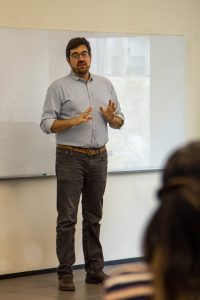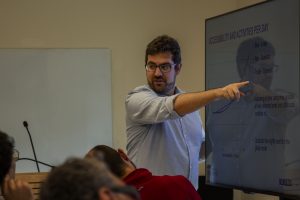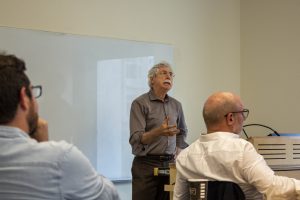
Professors Steve Farber and Eric Miller teamed up May 16 for the first seminar in the Cities By Design: The Future of Urban Mobility series, part of the Urban Challenge Project Seminars by the School of Cities.

A warm welcome and introduction to the series by Steve Farber was followed by his presentation, “Putting Social Inclusion Front and Centre: An Examination of Activity Participation in the GTHA and the Opportunities for Unlocking Suppressed Demand with Emerging Mobility Technologies.”

Eric Miller then presented “Modelling Mobility: Current Capabilities; Future Needs & Prospects.”
The Myhal Centre room was filled to capacity (35) for the free session, and attendees asked questions and engaged in discussion following the presentations.

The next seminar in the series will take place Thursday, May 30, 3:30-5 p.m., MY 320. Featured speakers will be Professor Amer Shalaby “Transit System Management using Passive Data, Simulation and Machine Intelligence” and Dr. Judy Farvolden “Preparing for 21st Century Transportation through Collaborative Research.”
Seminars are planned to take place every other Thursday through the summer months; details will be confirmed at School of Cities Events. All are welcome to attend and no registration is required.
About Cities By Design: The Future of Urban Mobility
For the first time in history, the majority of people live in urban settings. Cities are the engines of economic growth, but are plagued with challenges relating to resource allocation, constrained government spending, ecosystem protection, creating migrant and youth opportunities, social inequities, labour market changes and infrastructure aging. Thrown into this arena, emerging technologies such as automated and connected vehicles, ride-hailing services, Mobility-as-a-Service platforms, and micro-transit are threatening rapid changes to our mobility systems. The academic and policy debates are rife with visions of new mobility utopias, where technology drives improvements in efficiency, CO2 emissions, and social inclusion. Also prominent are visions of mobility dystopias, where private vehicles control more of the public realm, mobility benefits are concentrated among the wealthy, and labour standards are eroded. Cities now face the massive challenge of evaluating the potential benefits, costs, and unintended consequences of integrating a heterogeneous mix of promising technologies with existing transportation infrastructure and mobility services.
In light of this uncertainty, it is imperative that we conduct evidence-based research to guide transportation policy to achieve the many positive promises of emerging technologies, while ameliorating the inherent risks in technology-induced disruption. The Future of Urban Mobility seminar series will provide the U of T community a space to engage on these topics and explore research opportunities with the Mobility Cluster at the School of Cities.

